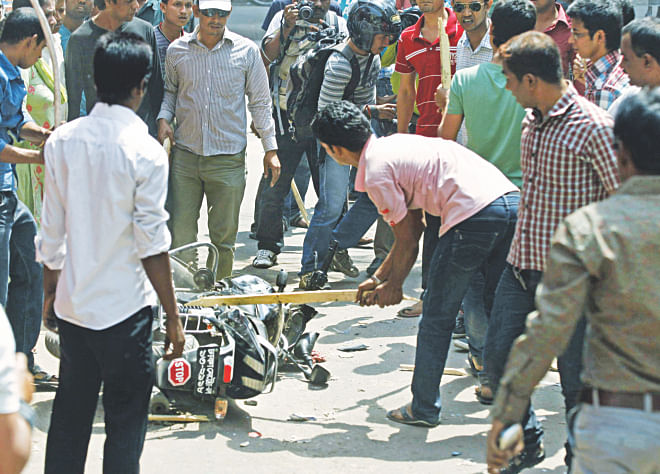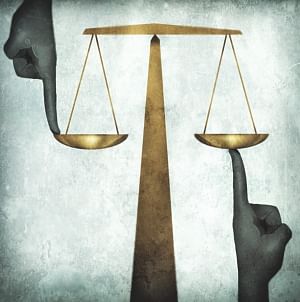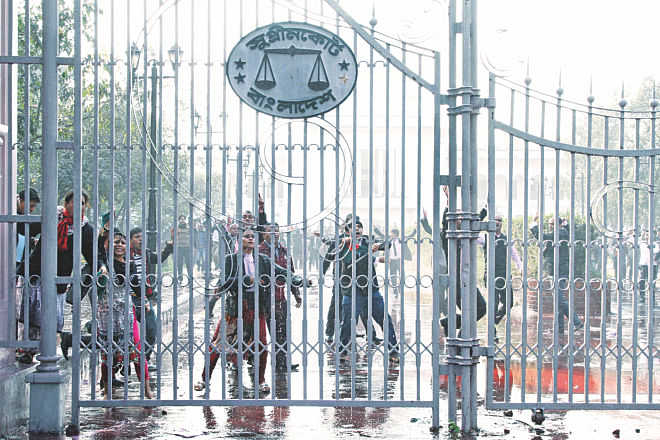Withdrawal of political cases: Rule of law stripped away

Although withdrawals of “politically motivated” cases have been going on for several years questioning criminal justice system and good governance in the country, there is no sign of redress from it soon.
The newly elected present government may continue with withdrawal of “false” and “politically motivated” cases.
The immediate past Awami League led 14-party alliance government has recommended for the withdrawal of a total 7,249 criminal cases including several sensational murder cases filed during the military backed caretaker government and BNP-Jamaat-e-Islami led four-party alliance government.
The BNP-Jamaat led government had reportedly recommended withdrawal of total 5,888 cases.
However, it could not be known whether all the recommended cases were withdrawn by the trial courts concerned during the regimes of the previous governments.
The present government is likely to continue to recommend withdrawal of the “false cases” on scrutiny, although a section of jurists are critical about the culture of withdrawal of cases.
Law Minister Anisul Huq told The Daily Star that the culture of withdrawal of politically motivated cases and filing false cases had started before 1996 when BNP was in power.
The then BNP government used to harass the people of opposition political parties through lodging false cases against them, which created an opposite reaction among the opposition parties, he said.
The law minister said when the opposition party [Awami League] came to power, they withdrew the false cases.

One can easily understand that repression against opposition party men between 2001 and 2006 through filing false cases had exceeded all limits, and therefore, the previous government [Awami League led 14-party alliance] had to take steps to withdraw the false cases through an enquiry, he said.
Anisul Huq said that the Anti Corruption Commission has not withdrawn any case during the tenure of previous government.
In future, the present government will also very seriously scrutinize any case before withdrawal of the same, he added.
Supreme Court lawyer Advocate Shahdeen Malik said withdrawal of political cases is clearly contrary to the rule of law.
The fact that criminal cases can be filed on political consideration that clearly indicates the rampant abuse of the criminal justice system by the ruling parties, he said.
Shahdeen Malik said that sadly, this is unlikely to be stopped soon as our political parties don't and cannot govern in accordance with law.
They govern through misuse and abuse of power and are likely to continue to do so, he added.
Withdrawal of politically motivated cases is a very bad culture for rule of law, judicial system and democracy, Advocate Khurshid Alam Khan, editor of Dhaka Law Reports, told The Daily Star.
Such culture should immediately be stopped, since this system will hamper the rule of law, judicial process and democracy, he said.
The offences, for which the cases were filed, could not be tried due to their withdrawal, Khurshid Alam, a Supreme Court lawyer for the Anti Corruption Commission, said.
He said there is a rule in the Code of Criminal Procedure (CrPC) for withdrawal of cases.
The government has to take permission from the relevant court to withdraw any case, he said, adding that if the court allows the government to withdraw the case, then it can be withdrawn.
Those, who will come to powers, will also withdraw the cases filed against their people, Khurshid Alam Khan said. Supreme Court lawyer and President of Human Rights and Peace for Bangladesh (HRPB) Advocate Manzill Murshid said withdrawal of politically motivated cases is one of main causes for the damage of rule of law.
Offence is always offence in the eye of law, and there is no “political” offence, he said, adding that all offences must be tried through judicial proceedings.
Manzill Murshid, who moved more than 100 public interest litigations at the High Court, said the offenders are spared of the trial and punishment due withdrawal of the cases against them.
Citing an example, he said if the cases, which are being filed for setting fires to and throwing petrol bombs on the vehicles, and for burning and killing people, are withdrawn by any government in future, the criminals responsible for the offences will not be tried and punished and then justice and rule of law will be hampered.
Manzill Murshid said the both the BNP led four-party alliance government and present Awami League led 14-party alliance government have withdrawn what they termed as politically motivated cases without considering the consequences.

The counsel said the government has powers to withdraw the cases on permission form the court under the CrPC.
Manzill said his organization has been considering filing a writ petition with the High Court challenging the legality of the government's power to withdraw the cases and seeking its directive to rescind this power.
Advocate SM Rezaul Karim, a former secretary of the Supreme Court Bar Association, said the government has no authority to withdraw any case.
The government can only apply to the trial court to permit it to withdraw any case, and if the court allows the government's application, then the government can withdraw the case, he said.
Rezaul Karim said the Supreme Court in different judgements have decided that court below (lower court concerned) will not allow the application of the government by any mechanical orders.
“The trial court must consider the merit of the case, accusation against the accused, nature of offence and grievance of prosecution. Court must consider the reality as it is evident from the record,” he said citing from a Supreme Court verdict
The lawyer said the prayer for withdrawal of the case by the public prosecutor is not enough to withdraw the case, according to the Supreme Court decisions.
He said the culture of impunity is really against the theme of rule of law.
The court should decide the matter of withdrawal of the case before both the parties of the case, he said, adding that the withdrawal of cases depends upon the quality, experience and standard of the judge of the court.
The then national committee for recommending withdrawal of “politically motivated” lawsuits on August 22 last year proposed dropping 72 cases, including around 10 murder cases against Bangladesh Chhatra League and Awami League men dating back as far as 1988.
The 72 recommended cases also included cases against two ruling party lawmakers — Amanur Rahman Khan of Tangail and Maj Gen (retd) Subid Ali Bhuiyan of Comilla.
Even though the committee was formed in February, 2009, to recommend withdrawal of “politically motivated” cases filed between 2001 and 2008, the committee went out of its way on August 22 last year and proposed dropping of at least two murder cases filed in 1988 and 1996 against Chhatra League men.
The withdrawal recommendations were made at the committee's 31st meeting held at the home ministry with the then State Minister for Law Qamrul Islam in the chair on that day (August 22 last year).
Following the meeting, Qamrul told reporters that a total of 277 cases — 166 new cases and 111 old cases — had been tabled for withdrawal recommendations. He said they recommended that 42 new cases and 30 old and pending cases be withdrawn.
Asked, he said no narcotics related cases were recommended for withdrawal and that “one or two murder cases were recommended [to be dropped]“.
However, contradicting his claim, a source, who was in the meeting, said withdrawal of around 10 murder cases had been recommended.
The minister said all the cases proposed to be dropped were referred to the national committee by the district committees that had been formed with deputy commissioners, additional deputy commissioners, superintendents of police and public prosecutors.
“Justifying” the withdrawal recommendations, he said during BNP-led government between 2001 and 2006, and the last caretaker government regime, Awami League men had fallen victim to false cases.
However, the meeting source said the committee had recommended withdrawal of a murder case filed on November 18, 1988, with Boalia Police Station in Rajshahi against Chhatra League leader Ruhul Kaddus Babu.
It also recommended withdrawal of the murder case filed on April 14, 1996, with Chittagong Police Station against Chhatra League leaders Suranjit Barua and Labu.
The committee also recommended the withdrawal of a case filed under the Explosive Substances Act against ruling party lawmaker Maj Gen (retd) Subid of Comilla. The case was filed in connection with arson at the home of BNP leader Khandaker Mosharraf Hossain during last BNP-led four-party alliance rule.
During the last BNP-led government rule, lawmaker Amanur was accused in a case filed in connection with a clash between Awami League and BNP activists in Tangail during which a man was killed. The case was proposed to be dropped.
The committee, on the same day (August 22 last year) cancelled its recommendation, made in its earlier meeting, to withdraw the case Prothom Alo reporter Tipu Sultan had filed against an Awami League leader in 2001 in connection with torturing the journalist.
Details of the other cases in question could not be known.
Professor Sarkar Ali Akkas, of Department of Law, Jagannath University, Dhaka, in an article on February 23, 2010 said “In Bangladesh, withdrawal of criminal cases has become a matter of great public debate since 2001. After BNP-led alliance was voted to power in 2001, reportedly it withdrew around 5,888 cases to release around 73,541 persons having been politically affiliated with the BNP and its allies. At the same time names of party supporters, who were accused in around 945 criminal cases, were also withdrawn by the government. Similarly, the present government [Awami League lead alliance] has taken steps to release large numbers of accused persons by executive action on the basis that these cases are fabricated due to political reasons. Such practice is not consistent with the concept of rule of law and of the independence of the judiciary”.
“It is to be noted that section 494 of the Code of Criminal Procedure 1898 [CrPC] empowers the public prosecutor to withdraw the name of any accused from prosecution. Under this section, any public prosecutor may, with the consent of the court, before the judgment is pronounced, withdraw from the prosecution any person either generally or in respect of any one or more of the offences for which he or she is tried. Thus the public prosecutor is invested with a general executive power to withdraw from prosecution subject to the court's consent, which may be determined on many possible grounds. The law gives the prosecutor a real discretion in the matter. In a case of withdrawal from prosecution, if the prosecutor takes a fair and independent step to withdraw a case then the court should accept this and permit withdrawal under section 494 of CrPC. However, the prosecutor must satisfy the court with regard to the reasons and circumstances justifying the withdrawal from prosecution”, Prof Sarkar had said in his article.
“There is no indication in section 494 of CrPC in respect of the grounds on which public prosecutors may make the application, or the consideration on which the court is to give the consent to withdraw a case. However, given the provisions of section 494, it can be said that the power of withdrawal of cases must be exercised in the interest of the administration of justice. The reasons for withdrawal must satisfy the judicial conscience of the court, and mere government's order directing withdrawal without valid ground is not enough to pass an order of withdrawal by the court,” he wrote.
The author is senior staff correspondent, The Daily Star.

 For all latest news, follow The Daily Star's Google News channel.
For all latest news, follow The Daily Star's Google News channel. 



Comments